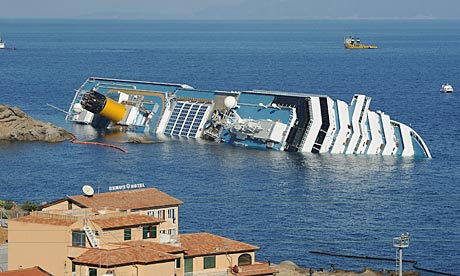Super-technology, super-useless

Behold Costa Concordia, the new Titanic*. The prow planted deep underwater, right deck submerged... The sight is eerie, almost surreal. The details about the reasons for this disaster remain mostly a mystery still. And the questions are more than the answers. Are such floating castles really as safe as they appear to be? This is a real concern among people now.
This tragedy can't help but call back memories of the disastrous sinking of Titanic** from a century ago. Then the hull of the presumably unsinkable ship was struck by an iceberg in the North Atlantic. Now Concordia was sunken by the rocks near the Italian island of Giglio***. The steel coat of the ship was cracked open and she sank within minutes. In both cases the criticism primarily fell on the captains, whose careless attitude lead to the downfall of two juggernauts, both then and now****. But still the modern level of technology is supposed to be much higher than it was a century ago, no? And still, the catastrophe couldn't be prevented.
The modern cruise ships are often full of hi-tech equipment that's even better than that of the most modern planes. I'm saying it as someone who has probably spent more time working at 6 miles above ground than anybody here. The navigation equipment includes digital maps, radars, echolot and autopilot systems that could maintain the course on their own. But those gadgets are not that easy to handle, and that could be a problem if the crew is not trained properly, or even if it is but it allows a moment of negligence. And this case was the perfect storm of errors plus huge amounts of irresponsibility, and now you can see the result.
The fact is that the radar and the echolot would've never been able to identify the underwater rocks at Giglio in time. The radar usually functions only above water, and the echolot which is mostly used for detecting obstacles that are deep underwater, is totally useless if the obstacle is too close to the surface, or if it's sitting at a particular angle. Of course there are more sophisticated gadgets but they cost millions and they're used only in special occasions like detecting mines.
And what about the reliability of the digital maps? The captain of Costa Concordia, the now infamous Francesco Schettino keeps claiming that those rocks were never shown on the map. But no matter if his claim is true or not (and, given his record of lies, we have a good reason to doubt in it), it's true that such a problem could really occur in maps. Such blank spots in cartography can never be ruled out completely.
But the presence of such lapses must already be very familiar to any experienced sailor. In any case, no sailor should blindly rely entirely on technology, and should be able to estimate the risks soberly. This is the number one requirement for a captain, and this one obviously failed there. Big time.
The question remains whether after the collision the major leak could've been avoided. The ship was almost brand new, just 6 years old. But the safety standards have changed many times since then. Since 2009 there are new rules in place about the safety of passenger cruise ships that are much stricter. This means that any ships built since then should be many times safer than Costa Concordia, for example they should have a greater number of waterproof layers. So the most modern ships are supposed to be much more stable in cases like this one.
So, granted, there may be no place for panic in the industry. Another example for tightened requirements is the so called Safe Return To Port system. All new ships should be able to reach the nearest port on auto-pilot and they should have reserve engines in case the main ones are broken.
In principle the latest cruise ships should be safer than the likes of Concordia. But even so, the older ones can't be characterized as "unsafe". The problem here was mostly human.
The other moment in this story is the PR part. After Italy was humiliated by the behavior of this piece of human scum, the captain Francesco Schettino, they were able to at least partially restore their dignity thanks to the commander of the port, Gregorio Maria de Falco. The recordings of their conversation in that fatal night displays two very different people. While Schettino was whining and lying and looking for all sorts of excuses for fleeing the ship and abandoning his duties, Falco was shouting at him and urging him to get back and save the passengers.
Italy has found its new villain and its new national hero simultaneously. Many have argued that this incident is symbolic and exposes the flaws in Italian society, but also there's a ray of hope in the whole story, because "Fortunately for every Schettino there's still one Falco to clean up the mess and balance things out" (a sentiment expressed via Twitter. In a way this reminds of the Berlusconi big FAIL and the subsequent Monti arrival as the savior of the nation. And while Schettino will now be prosecuted for manslaughter and will spend time in jail and be publicly disgraced, and quite deservedly I should add, Falco is being raised to the status of a demigod. He still insists that he just followed his duties and he did what every responsible person would've done in his place, but I guess every nation needs its heroes in hard moments like these, so I'd say - better embrace the glory, Gregorio! You totally deserve it.
* [edit] Well fine, not exactly.
** [edit] Yep. That's so stupid of me, isn't it?
*** [edit] And that's where the parallels end.
**** [edit] Okay then, this is another vague parallel, I'll give you that.